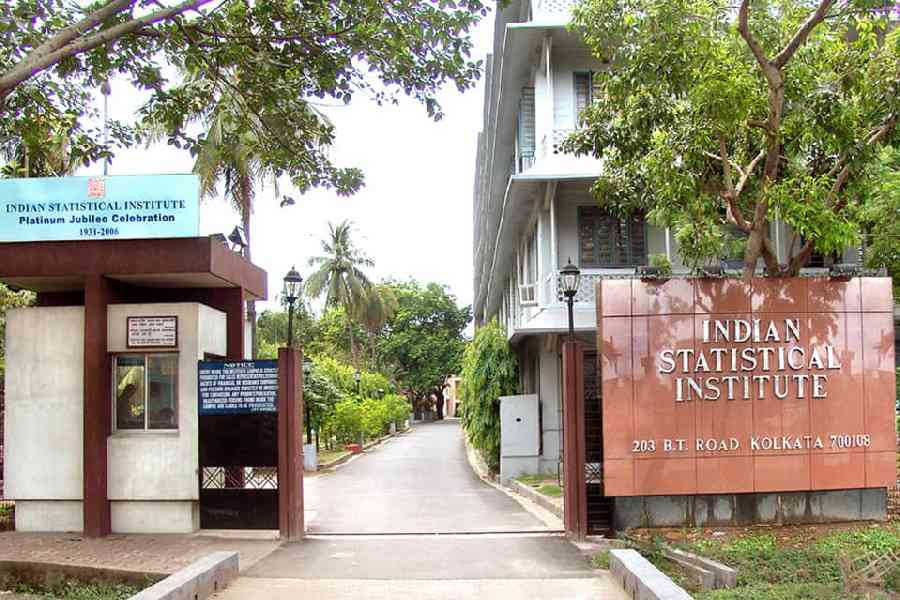Writings laced with communal hatred have appeared on the walls and doors of a hostel at the Indian Statistical Institute (ISI), Calcutta, sparking outrage among students, teachers, and alumni of an institution long regarded as a cradle of liberal, inclusive, and modern education.
The graffiti surfaced two days after a car blast in Delhi killed 13 people.
The writings told students belonging to a particular community that they were not allowed to enter the campus.
“This was unthinkable in the ISI we had known. Surely, things have changed for the worse,” said retired professor Abhirup Sarkar.
Around 4.30pm on Thursday, the institute issued a formal statement condemning the act.
“It has come to the notice of the Institute authorities that hateful and derogatory comments have been recently displayed against the members of a particular community at several places in the Boys’ hostel (C.V. Raman Hall) of ISI. This is for the information of all concerned that ISI is founded on the principles of inclusivity, mutual respect, harmony and diversity,” said the statement signed by dean of students Biswabrata Pradhan.
“The use of language that promotes hatred, discrimination or disharmony among individuals based on their religion, caste or community, is a direct violation of our core values and the established code of conduct. Any activity or action that hurts the sentiment of others, implies any discrimination based on caste, religion, gender, etc. or has the potential to affect the harmonious academic environment of the Institute, is unacceptable and needs to be denounced unequivocally,” it stated.
“Such an act creates a hostile environment and also tarnishes the reputation of the institute. The institute strongly condemns this incident in the strongest possible terms. ISI will take action in accordance with the law of the land against the perpetrators for hurting the sentiments of a particular community and trying to disturb the social fabric of the Institute,” the statement added.
Dean Pradhan added separately: “Necessary actions will be taken.”
The writings were first noticed on Tuesday, November 11, by residents of the C.V. Raman Hall, where both graduate and postgraduate students stay. A student told this newspaper that the graffiti appeared in at least six locations around the hostel.
“Even a dustbin on the second floor and the railing of the east-wing staircase were smeared with these words. This is outrageous and divisive,” the student said. “It is unbecoming of an institution founded by Prasanta Chandra Mahalanobis.”
A section of ISI students met the dean on Wednesday to demand action.
Sanghamitra Bandyopadhyay, officiating director of ISI, Calcutta, told Metro: “What has happened is an aberration. The institute does not support this. ISI is known for research and academics, not for this. We are forming a fact-funding committee to probe this. Based on the probe’s outcome, the next course of action will be decided.”
Teachers described the incident as deeply disturbing and contrary to ISI’s legacy. One faculty member said the intellectual foundation of the institute — shaped by the ideas of Rabindranath Tagore, Brajendranath Seal, Satyendranath Bose, and Mahalanobis — was built on an inclusive and scientific spirit.
“A large portion of ISI’s land and property was personally contributed by Mahalanobis,” a teacher told Metro.
“That such divisive graffiti has appeared in this iconic institution is appalling. The offenders chose a hostel named after Nobel laureate C.V. Raman — scientific temper clearly means nothing to them when hatred takes over.”
“They have not only defaced the hostel, they have defaced the spirit and ethos of the institution,” the teacher added.
Another teacher said the incident reflected a larger, growing trend. “Fostering divisive mindsets among students in higher education has been underway for the past few years. ISI Calcutta is the latest victim,” the teacher said.
An official from the dean’s office erased the graffiti on Thursday afternoon.
Other campuses
Similar writings had surfaced earlier this year at Bidhan Chandra Krishi Visvavidyalaya in Nadia, after a terrorist attack in Kashmir’s Pahalgam on April 22.
Incidents highlighting ideological or social divides have also emerged in other premier institutes. In August, students at IIT Kharagpur’s B.R. Ambedkar Hall received an email mandating “compliance with vegetarian and non-vegetarian seating arrangements” in their dining hall.
The policy reignited debate about inclusivity at premier technical institutes. The segregation plan was later scrapped in September after protests.
In August last year, IIT Bombay’s Amul Canteen banned non-vegetarian food entirely, declaring itself a “pure-vegetarian eatery” where bringing in any non-vegetarian items was “strictly not allowed.”
An ISI teacher, reflecting on these developments, said: “We allow this hatred and divisive mindset to proliferate on campuses so young minds can be poisoned. What has happened at ISI is not a one-off incident. There is a pattern at play.”










